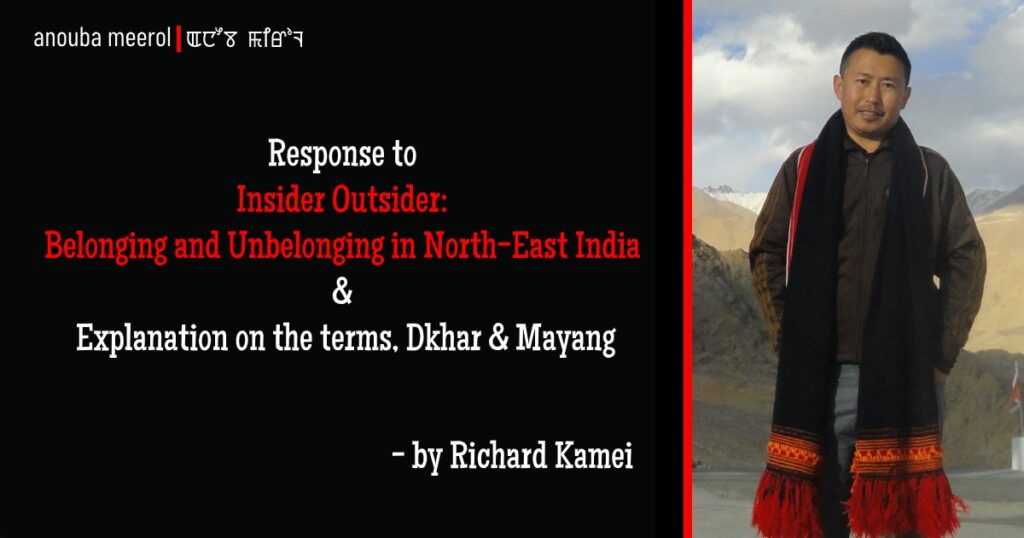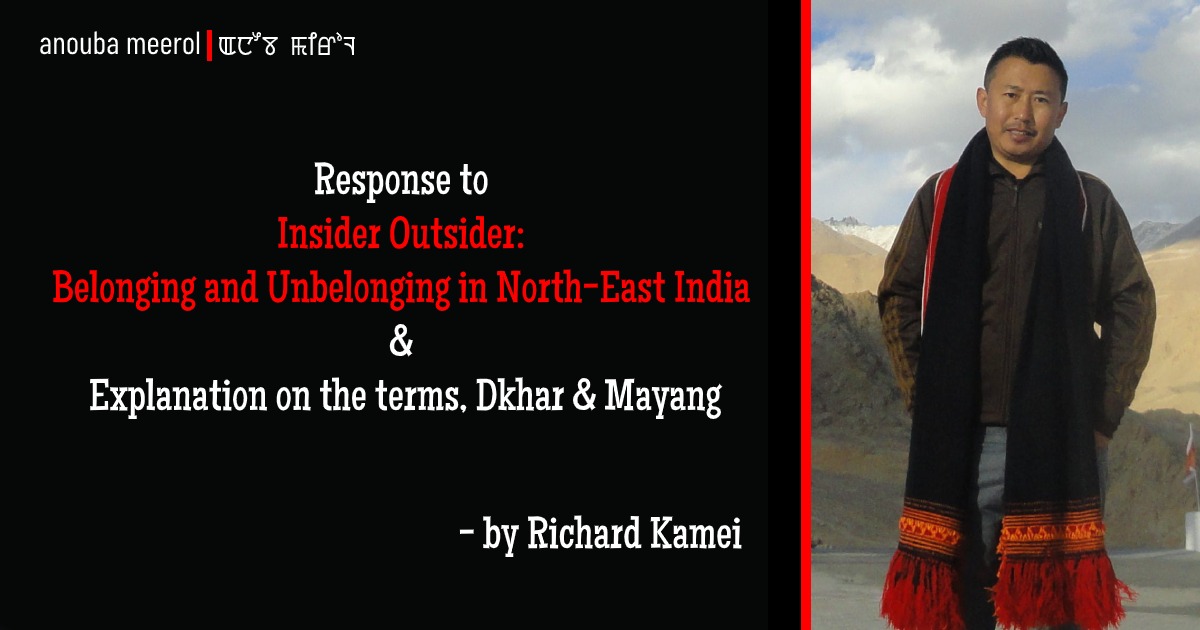
Of all the folks, who are being hailed as intellectuals in South Asia, it takes Ramchandra Guha to subtly suggest the fundamental problem in the book titled Insider Outsider: Belonging and Unbelonging in North-East India by stating this: “…but I wish, however, that this book had also included an essay by an insider, a Khasi with indigenous cultural claims to the town & the region.” The book is edited by Preeti Gill and Samrat Choudhary. To the comment made by Guha, this has always been the case where people from northeast are still struggling to get their voices heard, voices that have been silenced systematically and structurally. This book, going by its reviews and the background of one of the authors, affirms the horror of settler colonialism that indigenous people continue to face and furthers the same in the form of epistemic violence by mischaracterizing indigenous people. The book, for all the incidences and experiences of violence and ill treatment meted out to the outsiders, is terrible and very tragic, but to use these narratives to equate it with racism faced by people from northeast in mainland India, is extremely misleading and insidious! A false equivalence as such certainly comes off as preposterous, and is an outright attempt to invalidate decades of struggles and resistance from northeastern region of India, the everyday racism we face in cities like Delhi and other metropolitan cities (the absence of racism law), the AFSPA, the absence of sixth schedule in certain states in northeast India, and so on. The book does not just try to build a case for the outsiders in the northeastern region against the indigenous people’s experiences of historical injustices and their constant struggle against the powerful and privileged. It also becomes blatantly racist as it tries to weave a case for reverse racism, something which does not exist.
One must also analyse the social and historical location of people’s background in the label “outsider vs insider”- the outsiders as claimed in the book comprises mostly from powerful and privileged communities, in contrast to insider people, who are still at the receiving end of injustices passed down from the colonial times. The outsider lots here are the same people, who enabled settler colonialism in the northeastern region of India and brought in Adivasis from central India, which inadvertently complicates the struggle of indigenous people and creates a new form of complexity and contestation amongst the oppressed people.
In one of the book reviews, there is a passing remark which states that dkhar and mayang terms are more or less the same to the racist label, chinkies. This equivalence does more harm than the racist slurs, or the equivalence itself is stealthily promoting racism. The process of naming the unknown is rooted from the past, much before the colonial times, and it also occurred during the colonial era; the names which the indigenous people identify themselves with were never acknowledged until the last six to seven decades onward. We were called junglee, uncivilised, savages, barbaric, etc, and the names, “Naga”, “Kacha Nagas”, “Kabui Nagas” etc, and names of places in Manipur- Senapati, Bishnupur, Churachandpur, etc. were given to us by outsiders and the British, although we have our own names, Zeme, Liangmai, Rongmei and Inpui etc (here, I am referring to my social location). These certainly indicate that the outsiders were instrumental from the past in superimposing anything as per their whims and fancies, on indigenous people. A position as such comes from their being as historically dominant and powerful community, in relation to indigenous people. It is in this context , we must bring in the book’s attempt to equate dkhar, mayang, tajongmei with chinky. We must factor in power dynamics in the equation the book makes. Indigenous people being alien to mainstream culture and language, they use their language in identifying the outsiders by coming up with terms like dkhar, mayang and tajongmei. The meaning of tajongmei in my mother tongue is to refer to a group of outsider people who speak Hindi. It does not bear any connotation rather it conveys that they are powerful people. These names can never be equated with ‘chinky’, uncilvilised, savages, barbaric etc which bear a testimony to historical racism, oppression and subjugation.
The violence meted out to outsiders is abhorrent and should be condemned, which the book is talking about. These violence arose as a consequence of the apathy of the state and its design towards the indigenous people where indigenous voices and demands in claiming their rights over lands, resources and opportunities are largely being sidelined. The indigenous people were unprepared in opening up to the outside world; the British forcibly conquered them and left behind their places porous. With no proper mechanism to uphold and protect their lands, culture and customs; the influx of people from neighbouring places and beyond is being seen as a threat to their existence and their belongings. This instills fear, anxiety and insecurity in the minds of indigenous people towards outsiders. To erase these contexts, histories and circumstances in the book is very misleading and insincere. The book depicts occasional violence and hatred towards the outsiders with an attempt to equate it to the racism and colonialism faced by the people from northeast. It is a blatant disregard of history, struggle and everyday racism faced by indigenous people from the states of the northeastern region.
– Richard Kamei, Research Scholar
Reviews:
- Guha, Ramcharan (2019). “Insiders and outsiders in India’s Northeast.” The Telegraph. July 5, 2019. https://www.telegraphindia.com/opinion/insiders-and-outsiders-in-india-s-northeast/cid/1693785
- Chanda Vaz, Urmi. (2019). “This collection of writing on North-East India asks disturbing questions about a clash of identities.” Scroll.in. March 17, 2019.
- Banerji, Ranjona. “Otherness and unbelonging in the Northeast.” Asian Age. March 31, 2019. https://www.asianage.com/books/310319/otherness-and-unbelonging-in-the-northeast.html
* A version of the article has been already published as a note on the author’s facebook page.
